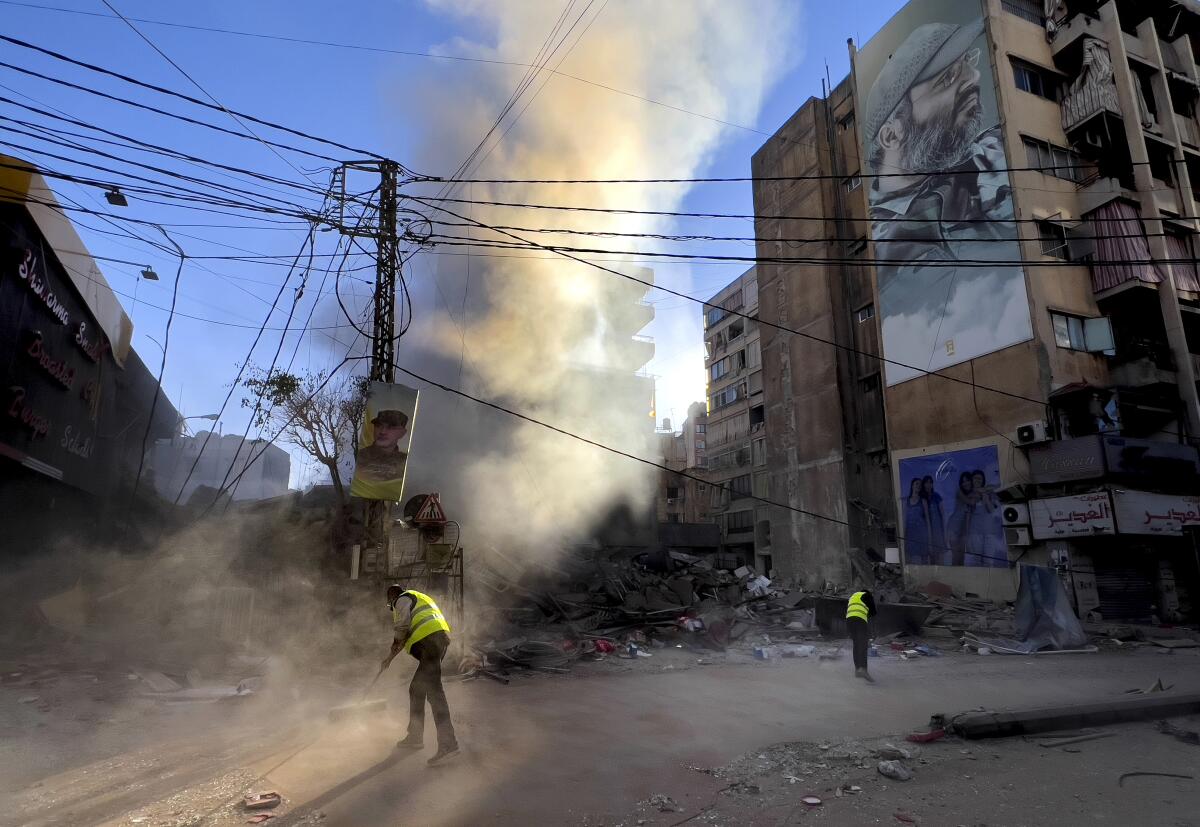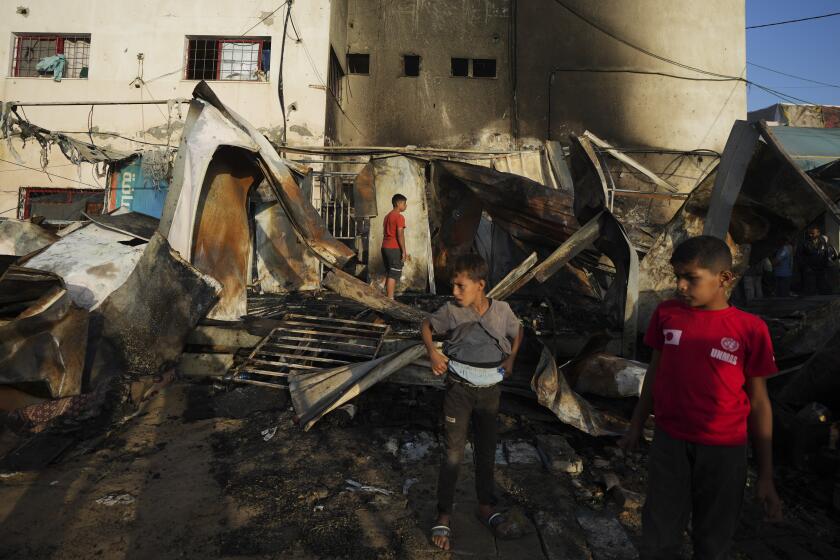Israel says it will target Hezbollah’s financial arm and announces imminent strikes in Lebanon

DEIR AL BALAH, Gaza Strip — Israel’s military announced Sunday it will now take aim at the Lebanon-based Hezbollah’s financial arm and planned to attack a “large number of targets” in the coming hours in Beirut and elsewhere. Explosions began in Beirut’s southern suburbs about an hour later.
Israeli military spokesman Rear Adm. Daniel Hagari said they were issuing evacuation warnings and “anyone who will be near the sites used to finance Hezbollah’s terrorist activity is required to stay away from them immediately.” The first warnings affected southern Beirut and the eastern Bekaa valley.
The strikes will target al-Qard al-Hassan “all over Lebanon,” a senior Israeli intelligence official said. Al-Qard al-Hassan is a unit in Hezbollah that’s used to pay operatives of the Iran-backed militant group and help buy arms, the official said, speaking on condition of anonymity in line with army regulations.
The registered nonprofit, sanctioned by the U.S. and Saudi Arabia, provides financial services and is also used by ordinary Lebanese. Its name in Arabic means “the benevolent loan,” and Hezbollah has used it to entrench its support among the Shiite population in a country where state and financial institutions have failed in recent years.
A year of escalating tensions and frequent cross-border fire between Israel and Hezbollah over the war in Gaza turned into all-out war last month, and Israel sent ground troops into Lebanon early this month.
President Biden sees an opportunity for peace, but both Israel and Hamas vow to fight on. U.S. may be misreading the situation — again.
Israel’s announcement came a day after U.S. Defense Secretary Lloyd J. Austin III called civilian casualties in Lebanon “far too high” in the Israel-Hezbollah war, and urged Israel to scale back some strikes, especially in and around Beirut.
Iran supports the Lebanon-based Hezbollah, and the United States is investigating an unauthorized release of classified documents indicating that Israel was moving military assets into place for a military strike in response to Iran’s ballistic missile attack Oct. 1, according to three U.S. officials. They spoke on condition of anonymity because they weren’t authorized to discuss the matter publicly.
Lebanese army says 3 soldiers killed in Israeli strike
Israel has increased strikes on southern neighborhoods of Beirut known as the Dahiyeh, a crowded residential area where Hezbollah has a strong presence. It is also home to many civilians unaffiliated with the militant group.
In southern Lebanon, the Lebanese army said three soldiers were killed in an Israeli strike on their vehicle. There was no immediate comment on that from the Israeli military, which said it struck more than 100 Hezbollah targets in southern Lebanon in the last day and continued ground operations there.
Lebanon’s army has largely kept to the sidelines in the war. The military is a respected institution in Lebanon, but isn’t powerful enough to impose its will on Hezbollah or defend the country from an Israeli invasion.
Contrary to critics who say the administration could force Benjamin Netanyahu’s hand, the U.S. has limited power to stop the conflict that began Oct. 7.
Israel’s military said Hezbollah fired more than 170 rockets into the country on Sunday. Israel’s Magen David Adom rescue service said three people were slightly injured from a fire sparked by a rocket attack on the northern city of Safed.
Medics warn of a catastrophic situation in Gaza
Israeli strikes on homes in the northern Gaza Strip overnight and into Sunday left at least 87 people dead or missing, the territory’s Health Ministry said, as a large-scale operation continued against Hamas militants said to be regrouping.
The ministry said 40 more people were wounded in the strikes on the town of Beit Lahiya, which was among the first targets of Israel’s ground invasion nearly a year ago. The Israeli military said it struck a Hamas target.
The U.S. is urging Israel to press for a cease-fire in Gaza following the killing of Hamas leader Yahya Sinwar last week. But neither Israel nor Hamas has shown interest in such a deal after negotiations sputtered to a halt in August.
Among the dead from the strikes in Beit Lahiya were parents and eight children, according to Raheem Kheder, a medic. He said the strike flattened a multistory building and at least four neighboring houses.
The Israeli military said it used precise munitions against a Hamas target. It said the area is an active war zone and it was trying to avoid harming civilians.
In a rare, direct threat, Biden administration says Israel has 30 days to step up deliveries of food, medicine as Gaza faces massive starvation.
Mounir al-Bursh, director general of the Health Ministry, posted on X that the flood of wounded from the strikes compounded “an already catastrophic situation for the health care system” in northern Gaza.
Six people, including a child, were killed when a strike hit a car in central Gaza’s Deir al Balah, Al-Aqsa Martyrs hospital officials said. The bodies were counted by AP journalists.
Doctors Without Borders, the international charity known by its French acronym MSF, called on Israeli forces to immediately stop their attacks on hospitals in northern Gaza after the Health Ministry said that Israeli troops had fired on two hospitals over the weekend.
The nonstop Israeli military operations over the last two weeks in northern Gaza “have horrifying consequences,” said Anna Halford, an MSF emergency coordinator.
Israel’s military said that it was operating near one hospital, but hadn’t fired directly at it.
Internet connectivity went down in northern Gaza late Saturday, making it difficult to gather information about strikes and complicating rescue efforts.
A year after the Oct. 7 attack that spurred the Gaza war, Israelis and Palestinians reflect. In their voices, they chronicle a devastating day, tragic year.
Israeli operation in northern Gaza enters third week
Gaza’s north has suffered the heaviest destruction of the war, and has been encircled by Israeli forces since late last year.
Israel ordered the entire population of the northern third of Gaza, including Gaza City, to evacuate to the south in the war’s opening weeks and reiterated those instructions this month. Most of the population fled last year, but around 400,000 people are believed to have remained.
On Oct. 7, 2023, Hamas-led militants blew holes in Israel’s security fence and stormed in, killing around 1,200 people, mostly civilians, and abducting 250 others. Around 100 captives are still being held in Gaza, a third of whom are believed to be dead.
Israel’s offensive in Gaza has killed more than 42,000 Palestinians, according to local health authorities, who don’t distinguish combatants from civilians. The war has destroyed large areas of Gaza and displaced about 90% of its population of 2.3 million people.
Shurafa and Magdy write for the Associated Press. Magdy reported from Cairo. Kareem Chehayeb in Beirut and Zeke Miller, Mike Balsamo, Eric Tucker and Tara Copp in Washington contributed to this report.
More to Read
Sign up for Essential California
The most important California stories and recommendations in your inbox every morning.
You may occasionally receive promotional content from the Los Angeles Times.














